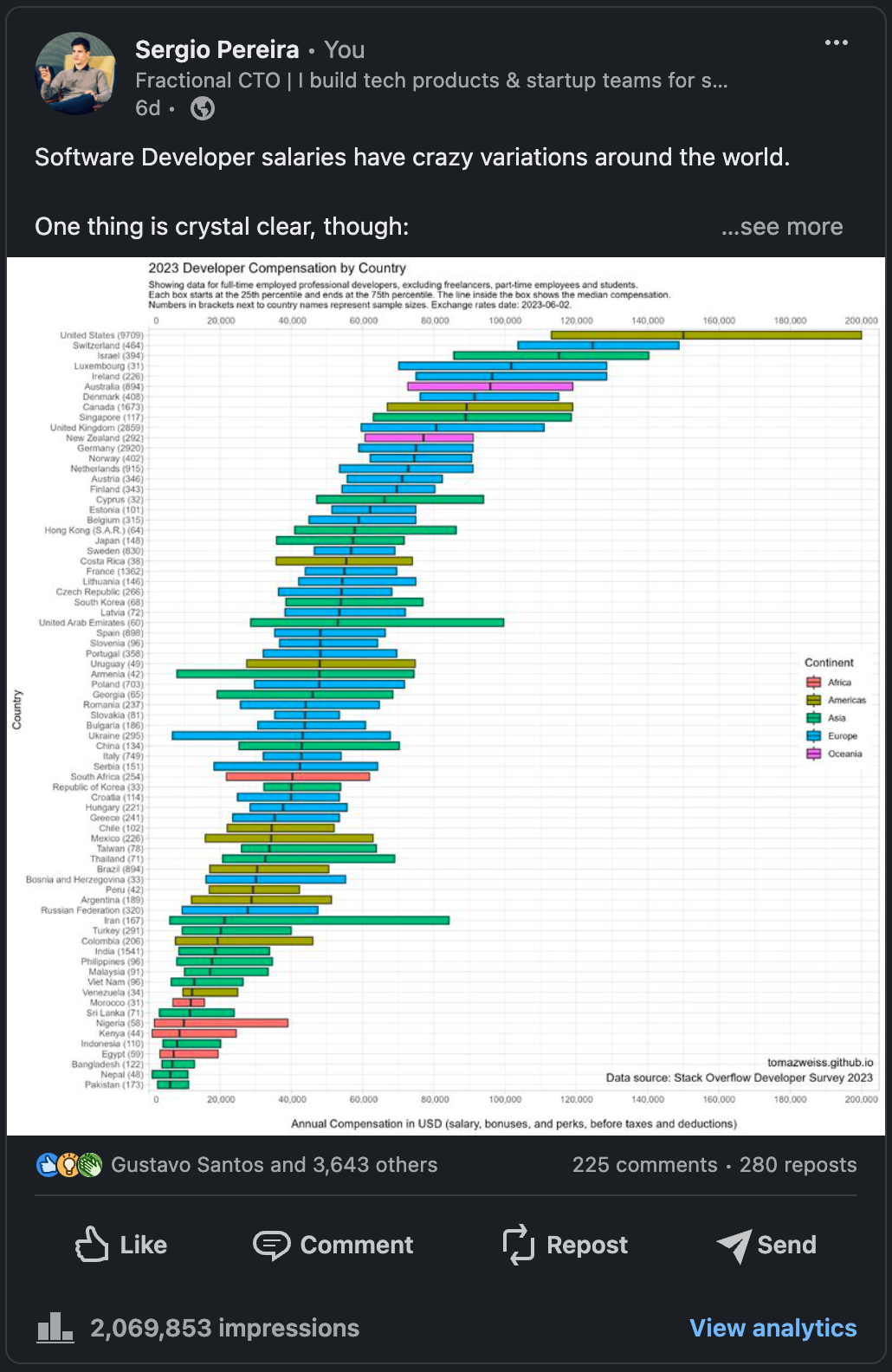Bridging the gap between low local wages and high US salaries in remote work
Hey,
I'm Sergio Pereira, and this is the Remote Work newsletter 👋
Last week, I wrote about earning a US salary while living elsewhere in the world (for instance in the EU, like myself). And especially the unique salary arbitrage opportunities that this setup can offer.
Interestingly, that newsletter edition went viral when I posted it on Twitter and especially on Linkedin.
Among such an intense debate in the comments, the most prominent questions boil down to:
• If most US companies try to lowball employees overseas, how can people in those countries negotiate up and earn those high US salaries?

Let me start by stating that I've done exactly that. Since 2016 I've worked remotely for US startup earning US salaries. Of course I started with a "low salary" for US standards (that was my entry way), and I grew from there. All while living in Portugal.
So let me give you some key tips to increase your value perception towards US companies, so you move up in the pay scale:
1/ Write online about your knowledge
I can't say this enough. Last week I mentioned this in the live session about my Fractional CTO career, at the Remote Jobs Braintrust, and people were rather surprised.
If you want to move away from your local low wages, you must make your location irrelevant for future employers. This is very tough to do when you apply to a job, because you'll be competing with other candidates and it's a race to the bottom.
By writing your knowledge online, future employers start following you, learning from you, and eventually they'll reach out to hire "you". This is a situation where you have very little competition, your local cost of living is irrelevant, and you have high negotiation leverage.
In fact, most inbound messages I get from clients that want to hire me as their Fractional CTO start with something like "I've been following you for several months...".
Given the interest this topic sparked in the community, I'll be lecturing the live session about "Generate inbound opportunities by writing online", if you're already a member please check the invite for Tuesday 23/April at 11am UK time. If you'd like to join, you can still grab your seat.
2/ Become world class at your niche job/stack
This is obviously easier said than done. Many companies pay location-independent salaries, and that means life-changing salaries for 99% of the people around the world.
If you're applying to these roles, you should be prepared for fierce competition. Technical rounds can be quite drilling, and you must bring solid experience plus some interview-specific preparation.
If you see companies like Gumroad, who pay over $200k/year to Software Engineers. They got 2000+ applicants in 48 hours, and 100 moved on to technical rounds. This type of role if for the absolute best talent in the world, and if you check Gumroad's employees they are indeed spread around the world working remotely and earning these high salaries. So, again, please know that it's possible.
3/ Explore pockets of low competition
Apply for jobs that pay well but for some reason don't get so much interest or visibility.
Some heuristics:
• Jobs that aren't published on job boards will get only the few applicants that visit the company's careers page. JobsCopilot.ai is great for these.
• Jobs mentioned in private communities or social posts with low engagement. These haven't yet been published anywhere, so they'll have very few applicants.
• Jobs in niche job boards, such as vertical "tech stack" job boards, or niche industry job boards. These will have only the applicants that visit those niche websites.
• Jobs in popular job boards that have "low salaries" in popular job boards, don't get as many applicants from US/UK/etc. Still a $60k or $80k/year job is already amazing for many applicants around the world.
• "Gigs" posted on freelance websites that mention full time availability get mostly "freelancer" applicants who aren't available for full time commitment. It's easier to standout.
I've built my career working for early stage startups, and I see these opportunities very often. Founders who don't know better will have the budget to pay, but might not know the channels where to find such hundreds or thousands of applicants. As a candidate, if you learn how to spot those, and you'll be in luck.
If you're struggling with finding such high paying remote jobs, reply this email with your questions and I'll try to help you out.
In other news, this will be an intense week at the Remote Jobs Braintrust with two exciting sessions:
• Tue 23/April: Generate inbound opportunities by writing online - lectured by myself.
• Wed 24/April: Fireside chat w/ Martynas Aliukevičius - who's just landed a high paying remote job and will share his story with the community.
Thanks for reading this newsletter until the end. You can read all past editions here. Make sure to share it with your friends and colleagues so they can read it too.
If you're interested in sponsoring this newsletter, send me an email or DM.
See you next Friday,
Sergio Pereira,
Startup CTO & Remote Work Lover


